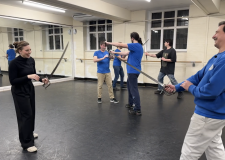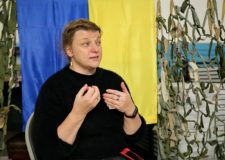On the drugs trail from Brighton to Mexico
Journalist and author Ioan Grillo talks quite calmly and casually about the death and violence that surrounds him.
He meets killers and drug cartel mobsters routinely in his job. But none of it compares to a night out in West Street in Brighton, he said.
The 38-year-old journalist has interviewed a man who said that he had killed so many people that he had lost count. And yet the conversation – in the middle of Mexico’s intensifying drug war – was otherwise normal.
In contrast, Ioan said that he felt more intimidated by the gangs and crowds in the heart of Brighton in the early 1990s.
The reality is though that the fear of the West Street Firm was a passing phase in Ioan’s life.
He went to school at Lewes Priory and Brighton, Hove and Sussex VI Form College (BHASVIC) and worked briefly as a porter at the Royal Sussex County Hospital. But he wanted to travel. And he wanted to be a journalist.
He said: “I was born in Lewes. My sisters both live in Brighton and my parents still live in Lewes.
“I went to Lewes Priory from 1984-89. Then I went to BHASVIC. I got kicked out of BHASVIC for not really studying hard enough and being a bit of a loud-mouthed punk rocker.
“I travelled a bit. I went to the University of Kent from the age of 23 to 27. I got a degree in history and politics and I wanted to be a journalist.”
 He ended up in Mexico. There, with no real experience or qualifications, he landed a job on a local newspaper.
He ended up in Mexico. There, with no real experience or qualifications, he landed a job on a local newspaper.
Ten years later the story that has grown to dominate his working life has spurred him to write a book.
El Narco is an addictive read, providing an astonishing insight into the lives of the people caught up in the drug trade.
He said: “In 2001 I bought a one-way ticket to Mexico and started teaching English for a few months until I got myself together.
“I got a job at an English language paper called The News. I was getting paid about £100 a week.
“It was my first job in journalism and I was going to press conferences with people like Kofi Annan, the head of the UN.
“I’ve been here for 11 years now and I’ve worked for a lot of TV and newspaper companies.
“I worked full time for the Associated Press for a couple of years.
“I worked full time for the Houston Chronicle for a couple of years.
“I’m a freelance for Global Post based in Boston. I’ve done stuff for Time magazine, the Associated Press, Al Jazeera English, Channel 4 News.
“I started covering these really interesting stories about crime and drug cartels.
“Since 2008 this has just shot off the scale. Suddenly it’s become of global importance. Suddenly my phone is ringing from all over the world.
“I found I had a privileged insight into a very important situation.
“In five years we have had 47,000 deaths. We’ve seen a single massacre of 72 people. Al Capone killed seven people!
“It’s really insane stuff and it’s very sad. I’ve interviewed a lot of mothers whose children have died.
“I’ve managed to interview gangsters, murderers, traffickers. It’s definitely scary.
“It’s weird sometimes. I’ve sat down with mass murderers. They tell you they’ve killed more people than they can count. They tell you they’ve cut people’s heads off.
“On the surface they come across as ‘all right people’. One sat down and told me he was a fan of Wigan FC because they’ve got a Colombian player.
“I’ve talked to thugs in the UK and they and things like the old West Street Firm seemed more scary.”
He is remarkably detached about the dangers of covering Mexico’s continuing tragedy which has cost the lives of more than 70 journalists since he moved there.
He is married with a daughter and admitted concern but said that he tried to write in a way that would not annoy the subjects of his stories.
“I do very personal stories but they’re more concerned about things that might disrupt their business or get them arrested,” he said.
In his book he writes about the burgeoning local drugs scene: “Students or dropouts from my school could be found getting high, low or on one all over the place from public gardens to public toilets.
“No one gave a moment’s thought to the far-off lands that the mindbending substances came from or what the drug trade gave or took away from those countries.”
He tells of four people he knew who died from heroin overdoses, including a friend called Paul.
He said: “I don’t personally blame the people who trafficked the heroin that caused Paul’s death. I don’t think he would either.
“But I do strive to understand the forces that led to it and search for a different world in which his death could have been avoided.”
El Narco is a powerful mix of the personal and political set into historic context.
It is a gripping read and includes a wealth of fascinating detail as well as the big picture confronting Mexico, America and the wider world.
The book is published by Bloomsbury.






















